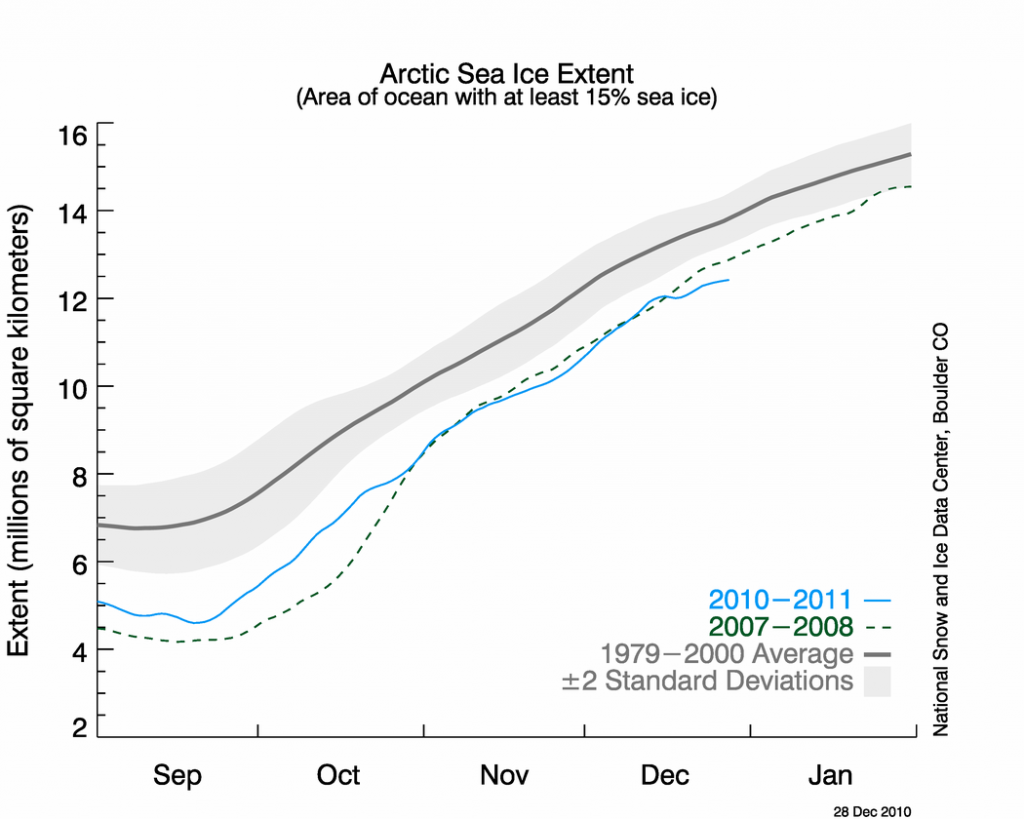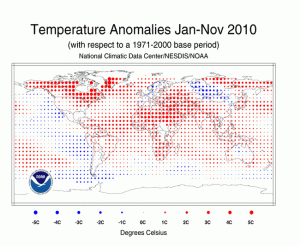29 December 2010
NOAA: January-November 2010- Hottest On Record
Posted by Dan Satterfield
 The National Climate Data Center (NOAA) released the November temp. data today and also put the year in context.
The National Climate Data Center (NOAA) released the November temp. data today and also put the year in context.
November was the second warmest on record with an average temp. of 1.24°F (.69C) above the 20th century average.
Even more interesting is the fact that from Jan.- November the global temperature is the warmest on record. This is all the more surprising since we had a very quiet sun (long solar minimum) and a strong La Nina. Both act to cool the planet.
You can also notice the greater magnitude of warming in the higher latitudes. Areas above 60 degrees north have warmed much more than areas further south. Some areas in the Arctic are nearly ten degrees F. warmer than a century ago now.
This same pattern of amplified warming in the high latitudes is seen month after month and is in line with predictions by most climate models. It’s also in line with the current scientific consensus of how the planet should warm, as greenhouse forcing increases.
 The strong negative phase of the North Atlantic Oscillation for much of December has also had an effect on Arctic Sea ice. A negative NAO (See previous posts) drains the cold air out of the Arctic.
The strong negative phase of the North Atlantic Oscillation for much of December has also had an effect on Arctic Sea ice. A negative NAO (See previous posts) drains the cold air out of the Arctic.
This is causing the freeze up to be much slower than normal. Arctic ice coverage has reached a new December low.
The lowest sea ice on record was reached in the early fall of 2007. You can see how this year compares to that one on the graph to the right from the NSIDC.
The question now is will the intense cold in Europe and the Eastern USA will be enough to keep 2010 from being the warmest year on record. Possibly but the La Nina in the Pacific may actually be the deciding factor.
A huge area of equatorial ocean is unusually cool as the strong La Nina is peaking. If a new record is set in spite of this, it will be an impressive sign that greenhouse gas forcing is now able to override even the planet’s strongest natural cycles.



 Dan Satterfield has worked as an on air meteorologist for 32 years in Oklahoma, Florida and Alabama. Forecasting weather is Dan's job, but all of Earth Science is his passion. This journal is where Dan writes about things he has too little time for on air. Dan blogs about peer-reviewed Earth science for Junior High level audiences and up.
Dan Satterfield has worked as an on air meteorologist for 32 years in Oklahoma, Florida and Alabama. Forecasting weather is Dan's job, but all of Earth Science is his passion. This journal is where Dan writes about things he has too little time for on air. Dan blogs about peer-reviewed Earth science for Junior High level audiences and up.